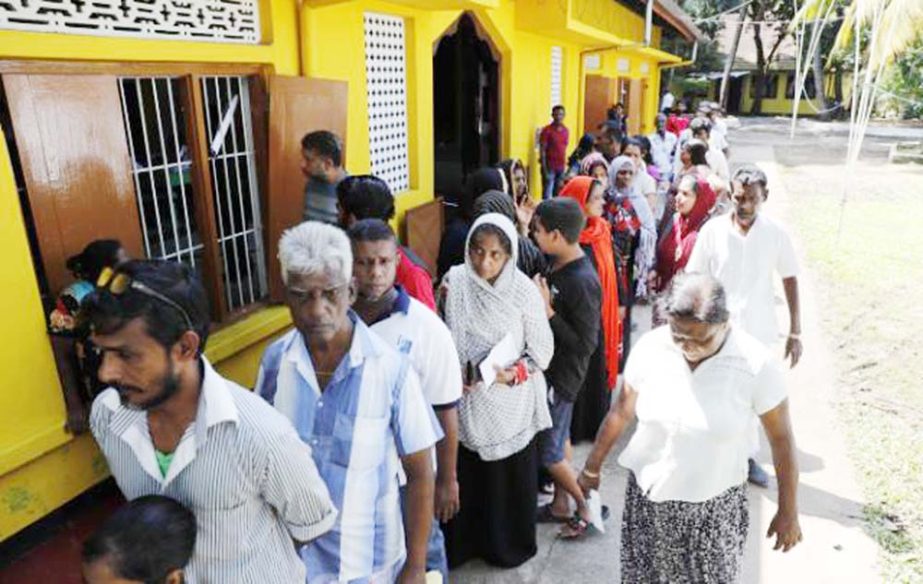
AP, Colombo :
Muslim voters traveling by bus to polling stations in northern Sri Lanka were shot at, pelted with stones and blocked by burning tires hours before polls opened in presidential elections Saturday, in what a member of the Elections Commission called a coordinated effort to disenfranchise the minority group.
There were no reported injuries and police were investigating, said Manjula Gajanayake, spokesman for the Colombo-based Centre for Monitoring Election Violence.
Campaigning for Sri Lanka’s presidential election was dominated by worries over national security, which was pushed to the forefront after deadly Islamic State-inspired suicide bomb attacks on Easter Sunday that killed 269 people. At the same time, there’s fear among both Tamils and Muslims about a return to power of front-runner Gotabaya Rajapaksa, a hard-line former defense official under his brother, ex-President Mahinda Rajapaksa.
The Rajapaksa brothers are revered by Sri Lanka’s Sinhalese Buddhist majority for defeating the Tamil Tiger rebels in 2009 and ending the nation’s long-running civil war. But because of their heavy-handed rule during and after the war, some minorities fear their return.
Rajapaksa had been widely expected to triumph over the ruling party candidate, Housing Minister Sajith Premadasa. But as the election approached, the race became very close.
Nearly 16 million of the 22 million people were eligible to vote and choose a new president from a record 35 candidates. President Maithripala Sirisena, who was elected in 2015, is not seeking reelection. Results are expected as early as Sunday.
A decade of peace following nearly 30 years of civil war was shattered earlier this year when homegrown militants pledging loyalty to the Islamic State group detonated suicide bombs at three churches and three hotels on April 21. Gotabaya Rajapaksa, 71, cast himself as the only candidate capable of protecting Sri Lankans from such attacks.
During the war, he is accused of persecuting critics and overseeing what were called “white van squads” that whisked away journalists, activists and Tamil civilians suspected of links to the Tamil Tigers. Some were tortured and released, while others simply disappeared. The Rajapaksa brothers are also accused of condoning rape and extrajudicial killings and deliberately targeting civilians and hospitals during the war.
The Muslims attacked Saturday were part of a convoy organized by Premadasa’s supporters and was taking them back to vote in the northern district of Mannar. Many Muslims fled the area in 1982, when the Tamil insurgency began to grow, and others were evicted from the north in 1990.
The Elections Commission had encouraged them to register as voters in Mannar but had not arranged enough transportation to bring them from their homes in the northwestern district of Puttalam, Gajanayake said.
Shreen Saroor, an activist working with displaced Muslims, said the attack made them more determined to vote and they were using public transport and private vehicles to get to the polling stations in Mannar.
“There is a concerted effort to keep the Muslims away from the ballot box,” Ratnajeevan Hoole, a member of the Elections Commission, told The Associated Press.
It wasn’t immediately clear whether any of the attackers had been arrested.
Hoole said he had called for the arrest of a former top Tamil rebel commander in the east now in alliance with Rajapaksa for making inflammatory comments against Muslims in the run-up to the election, but his request was not heeded.
The ex-rebel commander, Vinayagamoorthy Muralitharan, broke away from the Tamil Tigers in 2004 and worked with the government to defeat the rebel group. His split helped the government end the 26-year war.
Hoole said that in videos posted on social media, Muralitharan – also known as Karuna Amman – had talked about the need to suppress the Muslim vote to undermine Muslims’ growing influence in Sri Lanka’s Eastern province.

